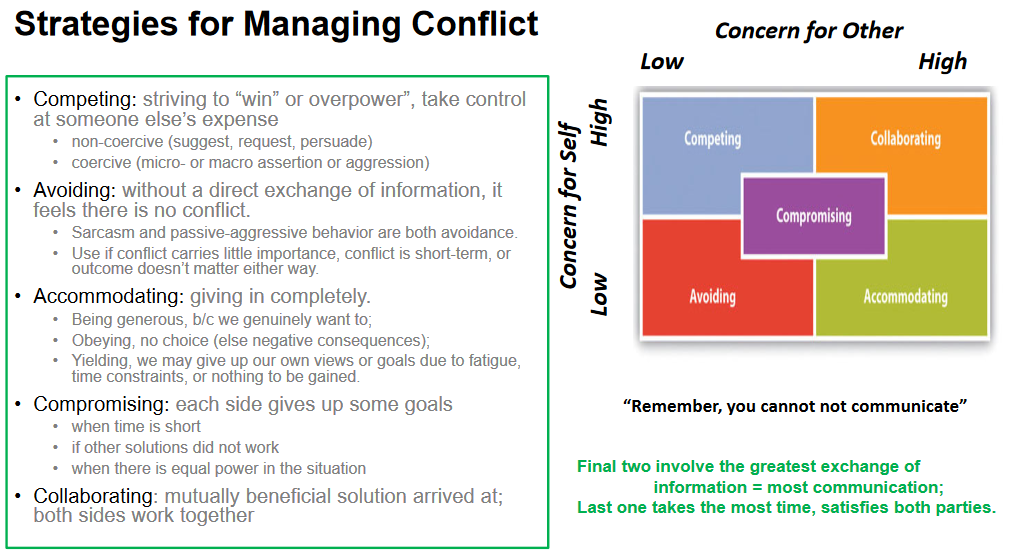Session 3: Obstacles and Solutions
Overview/Summary
This session will consist of a series of whole and small-group discussions and role playing scenarios related to obstacles, conflicts, and solutions. While conflict can be challenging, well managed conflict leads to richer professional and personal relationships. The key to managing conflict is learning how to maximize “concern for self” and “concern for other.” Falling short on either of these dimensions reduces the potential benefit of the conflict at hand. The figure below demonstrates the result of shortcomings on either spectrum, with “collaborating” being the ideal outcome.
Notes: Materials for this session were originally collated and presented by Babs Buttenfield and Laxmi Ramasubramanian
Learning Outcomes
At the end of this session, participants will be able to…
- Employ strategies for recognizing and managing conflict
- Set boundaries, negotiate, and employ other political survival options
- Be taken seriously in a professional setting
- Consider the language that they use, and that others use
- Respond to workplace bullying, intimidation, or micro-aggressions (patterns of behavior that are hard to identify formally but are nonetheless troubling and stressful on the receiving end)
Materials Needed
In this session, you will need the following materials:
- Paper
- Pens
- Lecture slides and summarized survey results
Pre-Workshop Tasks
Before this session, please complete the following survey, read the following article and complete the exercises at the end of the article:
- Survey: Conflict Management Styles Assessment (create workshop-specific survey based on these questions)
- Article and exercise: Conflict and Interpersonal Communication
Session Activities
1. Lecture and Review of Survey Results.
Adapt lecture slides and summarized survey results to the results of your workshop participants.
2. Self Reflection.
Reflect on some conflict in your work experience and how you managed it. What strategies were used by you? By others? Which ones did or did not lead to a solution?
3. Role Playing Scenario: Athletic vs Academic Priorities.
Break out into groups of 6 people (4 participants, 1 TRELIS leader, and 1 note taker).
- Scenario: A student athlete is missing class and falling behind on assignments. The professor has talked with the student, who is sincerely worried about their class performance. The professor sets up a meeting with the Athletic Department to discuss how to address the issue and help the student to catch up, miss fewer classes, and possibly to get some tutoring.
- Roles:
- The professor: “I want to help but can’t work effectively without athletic department cooperation, such as notifying me about planned team activities that lead to the athlete being absent.”
- The athletic director: “Why can’t faculty simply accept that academics are second priority insofar as athletes are concerned? Is this really an Athletic Department problem?”
- The athletic staff coordinator: “We have lots of funding to pay tutors, so the professor should find a tutor and figure out a way to schedule tutoring sessions around (unannounced) team activities.”
- The team coach: “Whatever happens, don’t take this student off my (winning) team.”
- The TRELIS leader will facilitate by keeping track of time and clarifying the scenario as necessary. Afterwards, they will work with the note taker to assess the outcome of the scenario and report back to the whole group
- The note-taker should record how the scenario works out without intervening in the actual. Is the conflict resolved? To whose satisfaction? The note-taker will work with the TRELIS leader to summarize and then present to the full workshop when groups reconvene.
- Procedure and Timeline
- Split into groups of 6 (4 participants, 1 TRELIS leader, and 1 note taker)
- Choose who will play each role (5 minutes)
- Play out the scenario using negotiation strategies (15 minutes)
- Share personal experiences within the 6 person group (10 minutes)
- Was the conflict difficult or easy to handle?
- Was it resolved effectively?
- Which of the five conflict management styles came into play?
- Which negotiation tactics came into play?
- Think about how language was used
- Individually, jot down 1-2 insights from the scenarios experience (5 minutes)
- For role-players: what was it like to play a role? Stressful? Close to a similar experience?
- For note-takers: What was it like to observe a scenario? Did you want to intervene?
- In 6 person groups, note-takers will summarize what happened and offer group members a chance to add comments (5 minutes)
- What negotiations were used? Were any particularly effective?
- What impact did you see from communication cues (verbal or non-verbal)?
- Did any role fit particularly into one of the five conflict handling strategies?
- Did any one strategy seem to escalate or de-escalate the situation?
- Everybody reconvene, report out and discuss (5 minutes/group)
- Which strategies were new?
- Which ones might you use to resolve future obstacles and conflicts?
